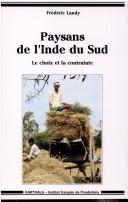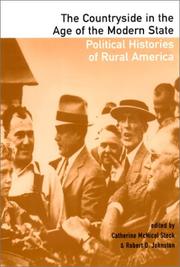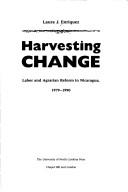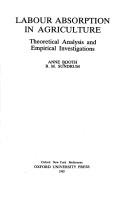| Listing 1 - 10 of 126 | << page >> |
Sort by
|
Book
ISBN: 3165448647 Year: 1984 Publisher: Tübingen : J. C. B. Mohr (Paul Siebeck),
Abstract | Keywords | Export | Availability | Bookmark
 Loading...
Loading...Choose an application
- Reference Manager
- EndNote
- RefWorks (Direct export to RefWorks)
Ouvriers agricoles --- Allemagne --- Conditions rurales --- Agricultural laborers --- Agricultural workers --- Farm labor --- Farm laborers --- Farm workers --- Farmhands --- Farmworkers --- Employees
Book
ISBN: 0773559531 9780773559530 9780773559547 077355954X 9780773558564 077355856X 9780773558571 0773558578 Year: 2019 Publisher: Montreal Kingston London Chicago
Abstract | Keywords | Export | Availability | Bookmark
 Loading...
Loading...Choose an application
- Reference Manager
- EndNote
- RefWorks (Direct export to RefWorks)
South African agriculture is characterized by growing labour unrest, evinced in recent years by high-profile strikes, but little is known about the sources and forms of day-to-day struggle. In Chiefs of the Plantation Lincoln Addison examines how labour conflict is fuelled by changing management practices and how workers respond and resist across spatial, sexual, and spiritual domains. Depicting, in rich ethnographic detail, daily life on a plantation, Addison describes how agriculture has been restructured in the post-apartheid era through a delegation of authority from white landowners to black intermediaries. He explains that while this labour regime enables the profitability of plantations, it gives rise to a fragile moral economy in which perceptions of what is tolerable and what is exploitation frequently clash. In this environment, transactional sex and Christian worship emerge as important terrains of gendered and spiritual contestation where women and low-ranking workers remain resilient in the face of unequal power relations. Meanwhile, plantations project an appearance of benevolent paternalism, particularly in the narratives and self-identity of white landowners. This book reveals how, in the everyday life of the community, both the plantation and the compound where the workers live serve as central grounds for the negotiation of labour relations. A groundbreaking study that uncovers how migrant plantation workers challenge their exploitation, Chiefs of the Plantation is a rare glimpse into the often hidden world of labour struggle on contemporary plantations.
Agricultural laborers --- Plantations --- Farms --- Agricultural workers --- Farm labor --- Farm laborers --- Farm workers --- Farmhands --- Farmworkers --- Employees --- E-books
Book
ISBN: 0128172681 0128164093 9780128172681 9780128164099 Year: 2019 Publisher: London, United Kingdom : Academic Press, an imprint of Elsevier,
Abstract | Keywords | Export | Availability | Bookmark
 Loading...
Loading...Choose an application
- Reference Manager
- EndNote
- RefWorks (Direct export to RefWorks)
The Farm Labor Problem: A Global Perspective explores the unique character of agricultural labor markets and the implications for food production, farm worker welfare and advocacy, and immigration policy. Agricultural labor markets differ from other labor markets in fundamental ways related to seasonality and uncertainty, and they evolve differently than other labor markets as economies develop. We weave economic analysis with the history of agricultural labor markets using data and real-world events. The farm labor history of California and the United States is particularly rich, so it plays a central role in the book, but the book has a global perspective ensuring its relevance to Europe and high-income Asian countries. The chapters in this book provide readers with the basics for understanding how farm labor markets work (labor in agricultural household models, farm labor supply and demand, spatial market equilibria); farm labor and immigration policy; farm labor organizing; farm employment and rural poverty; unionization and the United Farm Workers movement; the Fair Food Program as a new approach to collective bargaining; the declining immigrant farm labor supply; and what economic development in relatively low-income countries portends for the future of agriculture in the United States and other high-income countries. The book concludes with a chapter called "Robots in the Fields," which extrapolates current trends to a perhaps not-so-distant future. The Farm Labor Problem serves as both a guide to policy makers, farmworker advocates and international development organizations and as a textbook for students of agricultural economics and economics.
Agricultural laborers. --- Labor market. --- Employees --- Market, Labor --- Supply and demand for labor --- Markets --- Agricultural workers --- Farm labor --- Farm laborers --- Farm workers --- Farmhands --- Farmworkers --- Supply and demand --- E-books

ISBN: 9791036549793 2865375285 Year: 2019 Publisher: Paris - Pondichéry : Institut Français de Pondichéry,
Abstract | Keywords | Export | Availability | Bookmark
 Loading...
Loading...Choose an application
- Reference Manager
- EndNote
- RefWorks (Direct export to RefWorks)
Les paysans du Tiers monde, et de l’Inde en particulier, sont parfois présentés de manière caricaturale comme des rustres irrationnels, parfois au contraire comme capables de maximiser le profit aussi bien qu’un homme d’affaires occidental. Mais à chaque fois, on sous-estime la diversité des logiques paysannes. C’est ce que cherche à éviter cet ouvrage qui traite des trois échelles géographiques de la vie des agriculteurs de l’Inde du Sud : la région (le « système rural »), le village, l’exploitation agricole. Cependant, à chacun de ces niveaux apparaît une opposition entre les deux régions du Karnataka : l’une irriguée par un important barrage, l’autre vouée à une simple agriculture pluviale ; la première enrichie par la culture intensive de riz et surtout de canne à sucre, l’autre ne survivant que par l’émigration. De nombreux éléments révèlent les contraintes ou les atouts dont doivent tenir compte les paysans : la structure des castes encore si hiérarchisée, les différences de classes, mais aussi les problèmes du crédit, des marchés et du bétail, le rôle de l’administration indienne, tout autant que le « poids » de l’hindouisme, souvent exagéré. Loin de se cantonner au particulier, l’ouvrage propose une grille d’analyse générale des logiques paysannes du Tiers monde. Pris entre les contraintes du milieu naturel et les politiques de développement rural de l’État, l’agriculteur y apparaît pleinement rationnel dans ses stratégies, en fonction de logiques qui n’ont pas toutes pour but le profit financier.
Peasants --- Agricultural laborers --- Agricultural workers --- Farm labor --- Farm laborers --- Farm workers --- Farmhands --- Farmworkers --- Employees --- Peasantry --- Rural population --- Marks (Medieval land tenure) --- Villeinage --- peasant --- intensive farming --- rural system --- farmer
Book
ISBN: 9789069845951 9069845954 Year: 2009 Publisher: Amsterdam KNAW Press
Abstract | Keywords | Export | Availability | Bookmark
 Loading...
Loading...Choose an application
- Reference Manager
- EndNote
- RefWorks (Direct export to RefWorks)
Agricultural laborers --- Agricultural workers --- Farm labor --- Farm laborers --- Farm workers --- Farmhands --- Farmworkers --- Employees --- Economic conditions --- Social conditions --- Gujarat (India) --- Economic conditions. --- Social conditions.

ISBN: 1501717731 9781501717734 0801438500 9780801438509 0801487714 9780801487712 Year: 2018 Publisher: Ithaca, NY : Cornell University Press,
Abstract | Keywords | Export | Availability | Bookmark
 Loading...
Loading...Choose an application
- Reference Manager
- EndNote
- RefWorks (Direct export to RefWorks)
"However urban the nation has become," Catherine McNicol Stock and Robert D. Johnston write, "twenty percent of its citizens still live outside major metropolitan areas. Moreover, rural economic activity-agricultural, extractive, recreational, and industrial-has an enormous impact on the nation's overall economic well-being. The stories of contemporary rural people still have the power to move us.... They reflect the values, dreams, and ideals at the core of the economically, racially, and ethnically diverse American experience."The Countryside in the Age of the Modern State moves rural history into explorations of modern politics: diverse rural peoples and their complex relationships to the American state in the twentieth century. The volume's contributors examine African American progressive farm organizers; the experiences of Caribbean and Mexican farm laborers; agrarian intellectuals in the New Deal; the politics of land and landscape in the Rocky Mountain west; and the origins of today's rural political movements.
Populism --- Agricultural laborers --- Political science --- Agricultural workers --- Farm labor --- Farm laborers --- Farm workers --- Farmhands --- Farmworkers --- Employees --- History. --- United States --- Rural conditions.
Book
ISBN: 0192638092 0191904538 9780192638090 0192638106 Year: 2021 Publisher: Oxford, England : Oxford University Press,
Abstract | Keywords | Export | Availability | Bookmark
 Loading...
Loading...Choose an application
- Reference Manager
- EndNote
- RefWorks (Direct export to RefWorks)
'The Prosperity Paradox' explains why farm worker problems often worsen as the agricultural sector shrinks and lays out options to help vulnerable workers.
Agricultural laborers --- Agricultural wages. --- Social conditions. --- E-books --- Agricultural workers --- Farm labor --- Farm laborers --- Farm workers --- Farmhands --- Farmworkers --- Employees --- Agricultural income --- Wages

ISBN: 0807843156 0807819573 0807861278 9780807861271 9780807837993 0807837997 9798890865250 Year: 1991 Publisher: Chapel Hill, N.C. University of North Carolina Press
Abstract | Keywords | Export | Availability | Bookmark
 Loading...
Loading...Choose an application
- Reference Manager
- EndNote
- RefWorks (Direct export to RefWorks)
One of the principal aims of the Sandinista government in Nicaragua was to end the exploitation of the rural poor. But its attempts to promote balanced economic development and redistribute agricultural resources created labor shortages that threatened the country's economic lifeline. New employment opportunities created through agrarian reform upset the delicate balance developed in pre-revolution years to meet the labor requirements of Nicaragua's two key crops, cotton and coffee. Laura Enriquez studied this problem extensively while working in Nicaragua between 1982 and 1989, and in Ha
Developing countries: agricultural and food problems --- Nicaragua --- Land reform --- Agricultural laborers --- Agriculture --- Agricultural workers --- Farm labor --- Farm laborers --- Farm workers --- Farmhands --- Farmworkers --- Employees --- Supply and demand --- Economic aspects
Book
ISBN: 0520968395 Year: 2019 Publisher: Berkeley, CA : University of California Press,
Abstract | Keywords | Export | Availability | Bookmark
 Loading...
Loading...Choose an application
- Reference Manager
- EndNote
- RefWorks (Direct export to RefWorks)
In her timely new book, Teresa M. Mares explores the intersections of structural vulnerability and food insecurity experienced by migrant farmworkers in the northeastern borderlands of the United States. Through ethnographic portraits of Latinx farmworkers who labor in Vermont's dairy industry, Mares powerfully illuminates the complex and resilient ways workers sustain themselves and their families while also serving as the backbone of the state's agricultural economy. In doing so, Life on the Other Border exposes how broader movements for food justice and labor rights play out in the agricultural sector, and powerfully points to the misaligned agriculture and immigration policies impacting our food system today.
Dairy workers --- Foreign workers, Latin American --- Agricultural laborers, Foreign --- Social conditions. --- agricultural economy. --- agricultural sector. --- agriculture. --- dairy industry. --- economy. --- essential workers. --- ethnographic portraits. --- farmworkers. --- food insecurity. --- food justice. --- food system. --- immigration policies. --- labor rights. --- labor. --- latinx. --- migrant farmworkers. --- northeastern borders. --- structural vulnerability. --- united states. --- vermont.

ISBN: 0198772041 9780198772040 Year: 1985 Publisher: Oxford Oxford university press
Abstract | Keywords | Export | Availability | Bookmark
 Loading...
Loading...Choose an application
- Reference Manager
- EndNote
- RefWorks (Direct export to RefWorks)
Agricultural laborers --- 634.0 --- Horticulture generally--?.0 --- Social Sciences and Humanities. Agricultural Economics --- Agricultural Economics (General) --- Agricultural Economics (General). --- 634.0 Horticulture generally--?.0 --- Agricultural workers --- Farm labor --- Farm laborers --- Farm workers --- Farmhands --- Farmworkers --- Employees --- Agricultural laborers - Asia
| Listing 1 - 10 of 126 | << page >> |
Sort by
|

 Search
Search Feedback
Feedback About UniCat
About UniCat  Help
Help News
News